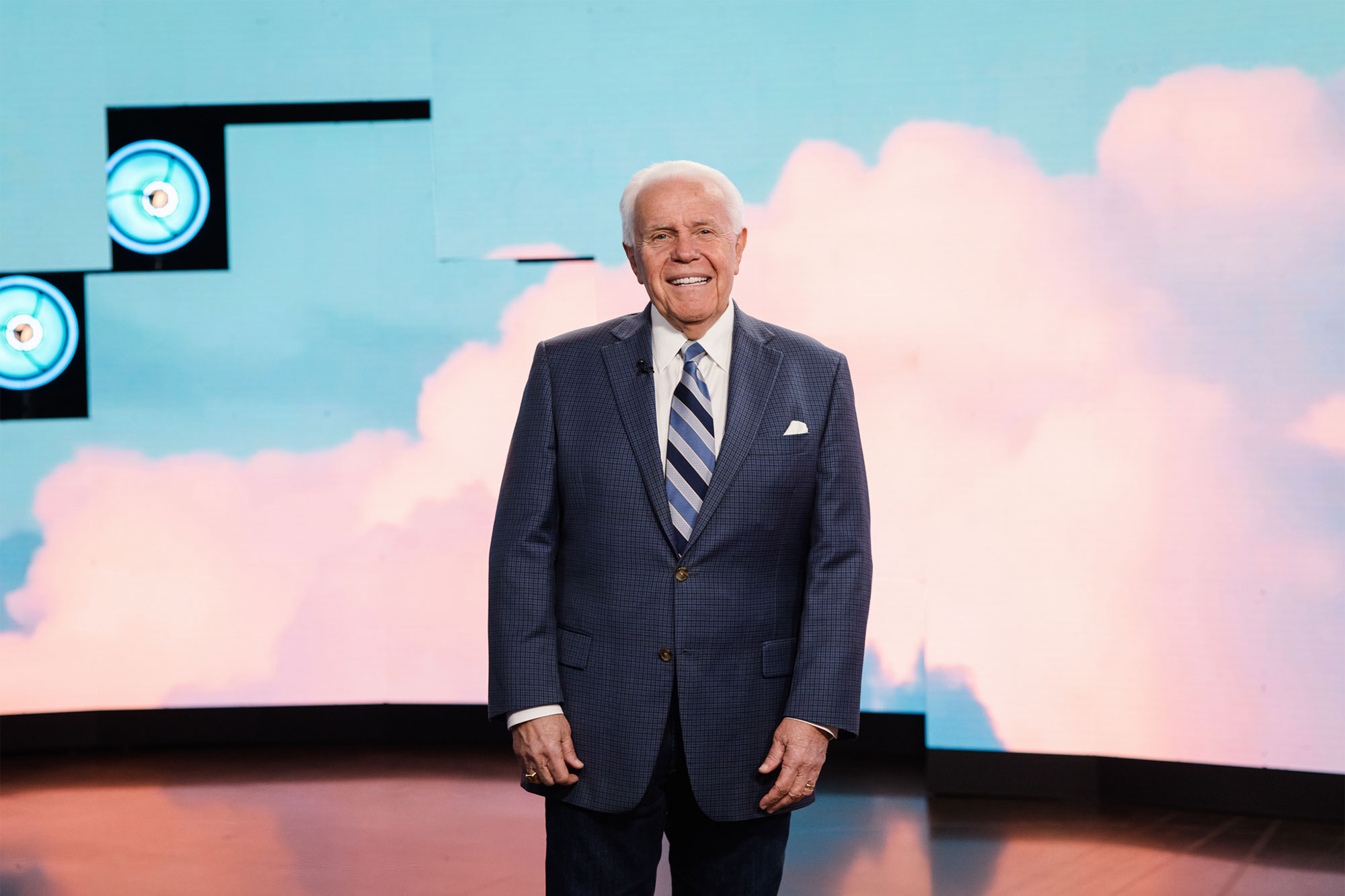Christmas & God’s Great Plan with Dr. David Jeremiah
Q: This month people the world over will celebrate Christmas. What does Christmas tell us about God’s plan for humanity?
A: In the Bible Jesus tells us why He came. He said, “The Son of Man has come to seek and to save that which was lost” (Luke 19:10). He came to be the Savior. I always tell people that He’s the only person who was ever particularly born for the purpose of dying. He came for one reason—to die. And from the very beginning He set His face toward the cross. He came for unbelievers and for those of us who have accepted Christ. He said, “I have come that they may have life, and that they may have it more abundantly” (John 10:10).
Q: Why did Jesus have to be born as a human?
A: Jesus became a man to fulfill prophecy. He said, “All things must be fulfilled which were written in the Law of Moses and the Prophets and the Psalms concerning Me” (Luke 24:44). There are more than three hundred specific prophecies in the Hebrew Scriptures about the promised Messiah, and Jesus came to fulfill them. He became a man to reconcile the Father in heaven with his children on earth. So, there would be a bridge between us and the Lord. Jesus was God walking around in flesh and blood to show us who God was. Because of Him, we can see what God is like and understand Him more fully. At the same time, becoming human allowed Him to understand and sympathize with us in our trials. Finally, He became a man to secure our hope of heaven. Without His death, burial, and resurrection, we would not have the great gift of salvation.
Q: What is the significance of Bethlehem as the birthplace of the Messiah?
A: Before Christ’s birth, Bethlehem already had a surprisingly mixed legacy. Bethlehem is first mentioned in the Old Testament in connection with the birth of Jacob’s son, Benjamin, and the death of Jacob’s wife Rachel. Later we learn that Ruth moves there with her mother-in-law Naomi, which is where Ruth meets and marries Boaz. And then we find Bethlehem providing ancient Israel its most enduring hero—King David. Rachel, Ruth, and David are all part of Jesus’ family tree. Because of this, Mary and Joseph were in Bethlehem for taxation purposes when Jesus was born, thus fulfilling the prophecy of Messiah’s birthplace found in Micah 5:2: “But you, Bethlehem Ephrathah, though you are little among the thousands of Judah, yet out of you shall come forth to Me the One to be Ruler in Israel, whose goings forth are from of old, from everlasting.” The Hebrew translation of Bethlehem means “house of bread,” and Jesus came to be the “bread of life.”
Q: From your perspective, what are some common misunderstandings people have about the historical context of Christmas and the birth of Jesus Christ?
A: There are a couple of common misunderstandings surrounding Christ’s birth. The first, and most prominent, is His actual date of birth. While we don’t know the exact date of Christ’s birth, we do have estimates and traditions from the Early Church that honored Christ and have been passed down through the generations with slight changes as society changed. The second would be the world that Christ entered. That period of history was a challenging time, and Rome ruled with an iron fist. But they also unified languages, created roads, and heightened trade. All these things combined to create the perfect moment in history for Christ enter and His message to spread to the ends of the earth. It’s not just a story; it’s a watershed moment in history.
Q: The Nativity story involves the presence of angels announcing the birth of Jesus. What is the significance of angelic involvement in the Christmas narrative, and how does it relate to our understanding of the divine intervention in human affairs?
A: Angels are God’s messengers; they provide guidance with clear and specific instructions. As in the case of the angel Gabriel appearing to Mary, telling her that she would give birth to the Messiah and later an angel appearing to Joseph, telling him that the child conceived in Mary was of the Holy Spirt. God chose His messengers to communicate the coming of Christ to this earth. Angels also worship at the throne of God in heaven so why wouldn’t He send them to worship at the birth of His Son—announcing that the Savior had been born and then celebrated His birth with a “heavenly host.” Throughout Scripture angels are called upon to carry out important tasks in God’s divine plan. Though we may not visibly see them, angels are constantly ministering between heaven and earth.
Q: Are there any specific biblical passages or stories related to the birth of Jesus that you find particularly inspiring or thought-provoking during the Christmas season?
A: The whole story is inspiring, but two things come to mind. The first is all the prophecies in the Old Testament that point to Christ’s birth. There are 316 of them, and Christ’s birth and life fulfill them all. The second is how He chose to come—in a borrowed manger attended by the lowliest of society. Kings came, but it was later. The first witnesses to Christ’s coming were shepherds. This shows us that Christ is reaching out to all people.
Q: How does Christmas embody the essence of hope, and why is that particularly significant in today’s world?
A: It only takes a quick glance at the news headlines to see that our world is suffering, and that people are in need of true, life-changing hope. The wonderful message of Christmas is that God has come into the midst of our suffering to help us face the challenges of life. The name for our Lord that reminds us of this truth is Immanuel, meaning “God with us.” “God with us” is not just a Bible truth; it’s a truth for today. It’s a truth that brings hope to people’s hearts. God became part of humanity so that one day we can be with Him. The Good News of the Gospel is the whole meaning of Christmas and the only thing that can bring hope to our hurting and chaotic world.
Q: What has been the most surprising thing you’ve learned while studying the Nativity?
A: That His first coming is just a glimpse of the hope we have for His second coming. While there are 316 prophecies of His first coming there are three times that many for His second coming. When Jesus comes again, it will be to take all believers home to be with Him forever. That is the true gift of the Nativity—He came once, and He will come again.
Q: What is one of your family’s favorite Christmas traditions?
A: Christmas meals are always at our home. Donna and I look forward to having our kids and grandkids there for a wonderful meal, to watch football, play games, and our newest tradition—watch Why the Nativity?.
Q: How can we ensure that Jesus remains at the heart of our Christmas celebrations amidst the distractions and secular aspects of the holiday season?
A: I love the music of Christmas, and listening to Christmas carols about Christ’s birth is a great way to keep Him at the forefront of my mind each December. Sometimes it’s hard for us who are goal-oriented to slow down long enough to wonder about Christ’s birth. But when we take some time during the Christmas season to ponder the real story of Christmas and interact with it so that it isn’t just a familiar story we hear over and over again, we are able to focus on the birth of our Savior. And finally, we should rejoice in telling everyone that salvation has come to earth in the Person of Jesus Christ. Christmas is a wonderful time to share the Gospel with others as the birth of Christ comes up naturally in conversation. It’s easy to miss Christmas in the midst of the distractions, but Jesus will remain at the heart of our celebrations when we take the time to stop and focus our mind on Him.
Share this
You May Also Like
These Related Stories

A War Against God? With Lance Wallnau & Jimmy Evans

To Heaven and Back with Jesse Duplantis

